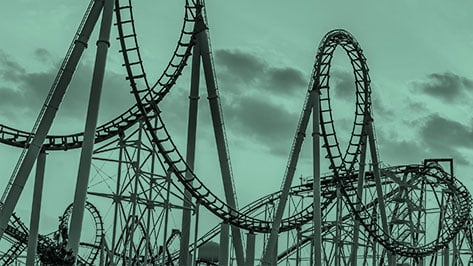Rollercoasters also go down (the reality of investing)

If you want to get really high returns from investing, you have to find the best stocks – well, that’s the theory at least. For the sake of argument, let’s assume that you were considering holding a concentrated investment portfolio – just a handful of truly elite companies. Perhaps you would look at ones like Apple Inc, whose share price rocketed up from US$10 to over $100 in just 10 years. Maybe you’d look to local superstars like Xero, whose share price rose from $1 to over $40 within seven years.
The company you select may perform well, and hopefully it will. However you have to acknowledge the chance that it won’t. The question is what can a badly performing share look like? If a well diversified fund returning 5% less than the market can be considered a poor result, what about a single share?
Looking at 2015, some of the worst performing shares were in the energy sector. Given the low oil price, this is quite logical. An example is Chesapeake Energy, one of the largest oil and natural gas producers in the US: at the start of 2015 you could buy a share for roughly NZ$25. By the end of 2015, that share would be worth NZ$6, a decline of three-quarters.
Another example could be Wynn Resorts, a hotel and casino operator. A Chinese crackdown on gambling affected Wynn’s Macau casinos, and its share price fell from nearly NZ$200 at the start of the year to around NZ$100.
While holding a concentrated position in these companies would be bad enough, there are worse scenarios – consider how companies like Bear Sterns, Lehman Brothers and Enron no longer exist.
This is just a function of the relationship between risk and reward – if you can potentially earn high returns, there is usually a high possibility of loss. You may be willing to accept the potential for high returns in exchange for the possibility of loss, but should you?
The first point to note is people react differently to winning and losing money. In general, losses hurt twice as much as gains.
Secondly, consider how a significant gain affects an investor compared to a catastrophic loss, especially if they are saving for their retirement. If that investor’s portfolio doubles in size, it will be highly appreciated and will probably allow the investor to significantly improve their lifestyle. Maybe this would take the form of a better car, a larger house and/or longer holidays.
If that investor has the misfortune to suffer a catastrophic loss instead, the investor will be facing a very bleak retirement. It could be the inability to own their own house, pay for suitable medical care or help their family.
The upside of such an investment (e.g. a better car or house, which could be classed as a “nice to have”) is not comparable to the downside (e.g. losing their house or being unable to afford medical care, which could be described as an essential goal). What investors need to focus on is their ability to achieve their essential or primary goals, and only then look at other goals that have a lower priority.
So if this being the case, are you focused on your goals? Do you know if you can achieve them? If not, you should be talking to your financial adviser.
Share This:
More Blog Posts:
 Beware the hidden costs of indexing
Beware the hidden costs of indexing Insurance Premiums - why are they increasing so much?!
Insurance Premiums - why are they increasing so much?!
 When the Face You Trust Is Fake: Why Deepfakes & AI-Driven Scams Are a Real Threat
When the Face You Trust Is Fake: Why Deepfakes & AI-Driven Scams Are a Real Threat